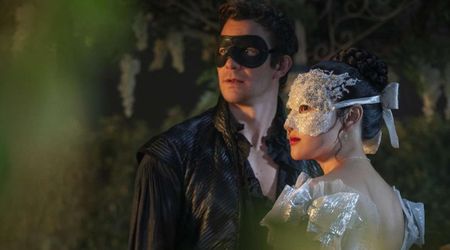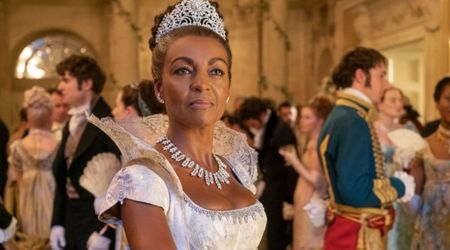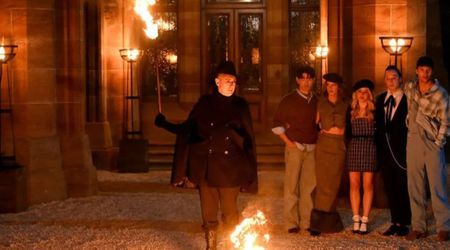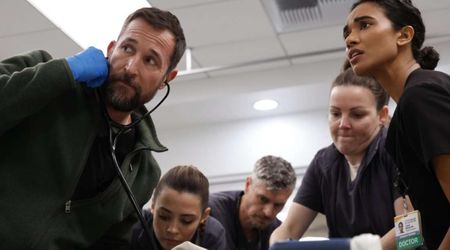Netflix's 'The Spy' is a disappointing mix of fiction and history although Sacha Baron Cohen does his best with the material

Oh, how we love our spies. How we love the way they stay on the knife-edge of danger. How we love their little gadgets, their extravagant lifestyles and the way they charm women and men. The genre is well-worn from 'James Bond' to 'Bourne Identity'.
And, the rules of the game were pretty well-set -- you had to have an ubermensch with a license (to kill or maim) and the government's bankroll to support a jet-set life in the service of the country. There had to be some bad men, usually brown or with some foreign accent that made it clear they were the bad guys.
There could be no greys. Or it would be difficult to immerse ourselves in the pleasure of seeing our superhero-like spy triumph. But 'The Americans' changed all that. For one, it drew from real historical events that shaped the protagonists' lives. Second, they were Russian and therefore not instant heroes.
The show spanning six seasons made spies flesh and blood human beings. For the first time, it hooked an emotional tether to the genre, making us wonder how it would be like to live year after year as someone else till a fake marriage became real, till a friendship tested personal loyalties against patriotic duty and parenthood meant lying to your own children who were separated from you, not just by a generation, but an entire way of life.
From then on, a spy thriller could no longer ignore the emotional life of its protagonist. The spy genre had been made emotional to the extent that even 'The Night Manager', pretty standard John le Carré fare, had to have Jonathan Pine, its oh-so-cool protagonist, experience mini-emotional breakdowns.
The show also changed his male handler role (in the book) into the very pregnant Olivia Colman (Angela Burr in the TV show), who mothered Pine in a way no handler in fiction ever has. So, while the six hours of Netflix's TV series 'The Spy' is unforgivable, it is easy to sympathize with creator Gideon Raff.
Not only does he have to contend with these shifts in the genre in terms of storytelling, but he also has to deal with 'Eliyahu Ben-Shaul Cohen' aka 'Eli Cohen'. Cohen is a bonafide Israeli hero, a spy whose unprecedented success in gathering intelligence, his daring interventions and eventual martyrdom has polished his legend to burnished gold. What's more, his wife and daughters are still alive. Eli Cohen's legend means there is not much room to craft a living, breathing and flawed protagonist.
So, Raff had to hark back to the ubermensch old-school spy model for his on-screen recreation of Eli Cohen, courtesy Sacha Baran Cohen, but sans the spice that might damage his posthumous aura. His Eli is a one-woman man, who struggles to keep his only cover affair going as 'Kamel Amin Thaabet', the wealthy, single and eligible Syrian bachelor in Damascus.
The real Eli Cohen (as Kamel) is said to have had as many as 17 lovers, all from high ranking Syrian families. He expressly cultivated these women because he wanted women he could manipulate into helping him escape if his cover was blown.
Raff also cannot resist the weight of history as he deals with central figures whose actions shaped Syrian and world politics into the present day. But instead of this weight helping him ground the series in a bit of real politics, it becomes an exercise in silly name-dropping.
Sometimes this comes across as mildly distracting, expositionary dialogue like the one between Eli and Michel Aflaq, the ideological founder of Ba'athism or references to the young Saddam Hussein or Yasser Arafat. And sometimes, it is downright hilarious like when Mohammed bin Awad bin Laden discusses how Kamel can use his business to smuggle equipment into Syria and his son "Osama" runs in to interrupt them. Yup, that happens.
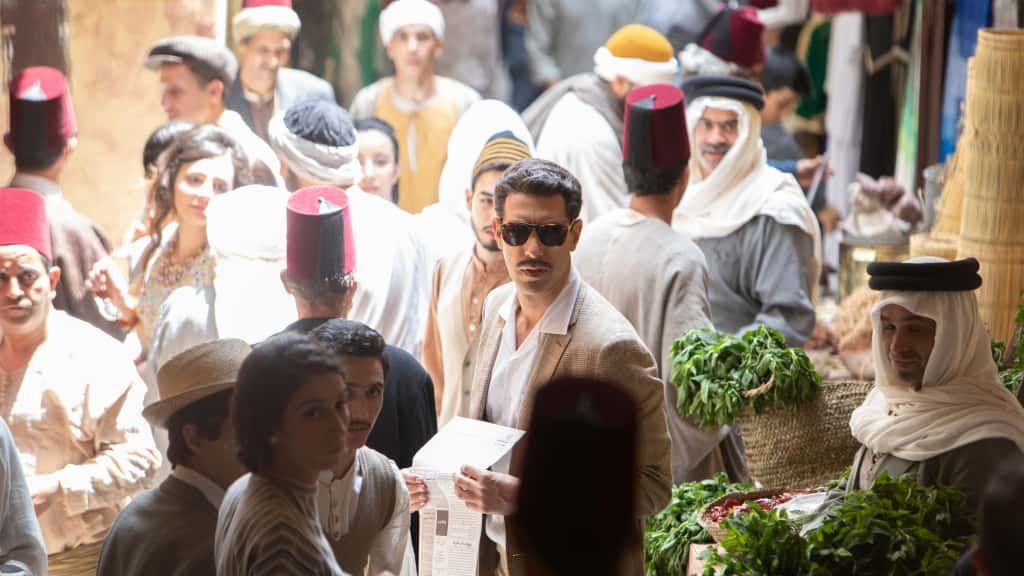
'The Spy', overall, suffers from a heavy-handed, on-the-nose approach. Its dialogues, editing and even color schemes spell out everything, worried that audiences (including its U.S.-based one) won't 'get it. So when Kamel struggles to remember his name is actually Eli while writing a letter to his wife before his execution, the rabbi in his cell, says loudly, "o poor boy, you don't know who you are!".
Each time Eli remembers his wife and vice versa, they are both shown eating bread and butter sitting on chairs in their respective kitchens, both looking longingly into the distance. If that wasn't enough, the scenes are then layered together so that they are in the same frame.
Each time we see Eli (or his wife) butter bread -- and this happens several times in the six hours -- it is a cue for how much they are missing each other. I expect Sacha Baran Cohen cry-eating bread to become a meme pretty soon.
To show how Eli is more at home in Damascus than Bat Yam, Israel, Syrian scenes are filmed in full color while the ones in Israel are faded monochromes like old prints. In trying to portray Eli Cohen as the perfect man and spy, and taking some distracting liberties with history to do so, Raff misses out in telling a truly extraordinary real story.
We never really get under the skin of Eli Cohen though Sacha Baron Cohen does his best with the material he is given. Also, while I'm not dismissing Sacha's acting chops, it is difficult to entirely forget his more flamboyant comic alter-egos and you half expect him to break in the middle of a scene.
It seems like Sacha, in his first starring, serious role, depended heavily on directorial guidance. Therefore his shifts in mood and stress levels seem abrupt -- like he is responding to cues -- rather than finding an inner compass to his character.
Another distracting casting choice is Noah Emmerich (Stan Beeman of 'The Americans') as Eli's handler, who is so keen on getting his accent right that his voice sounds almost robotic. But his performance soars each time he is in a dialogue-less moment, like the one he shares with Eli's wife, Nadia, at the breakfast table.
The only character that inserts the much-needed realism, in terms of human interactions, might, ironically, be a fictional one - that of Maazi Ad-Din, the nephew of a powerful General. He is a stand-in for the powerful friends Eli made to get closer to the Syrian military and who he dropped once he helped the Ba'ath seize power.
In all, Raff fails to craft a good contemporary spy yarn that allows the viewer to inhabit a spy's world, immersed in his POV and emotional state. Instead, we get the distance of a patriotic documentary that is about as moving as a memorial statue in the park, devoid of life.
The six-episode miniseries released September 6 and is available on Netflix.

